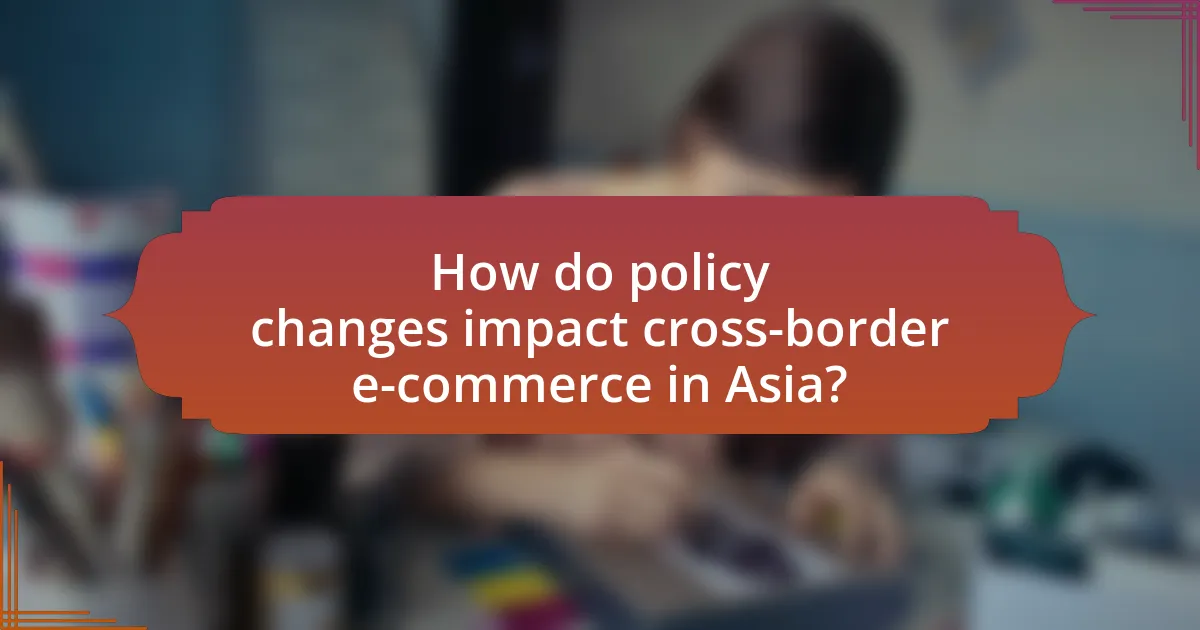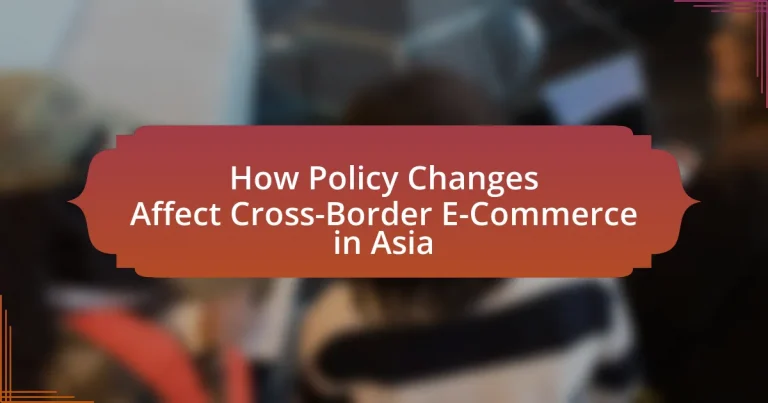The article examines the impact of policy changes on cross-border e-commerce in Asia, highlighting how alterations in trade regulations, tariffs, and consumer protection laws shape the landscape for businesses and consumers. Key policies discussed include trade agreements like the ASEAN Free Trade Area (AFTA) and the Regional Comprehensive Economic Partnership (RCEP), which facilitate market access and reduce tariffs. The article also addresses the implications of data protection laws on consumer trust and purchasing behavior, as well as the challenges businesses face in compliance and operational costs due to varying regulations. Additionally, it explores future trends in policy development and offers practical strategies for businesses to navigate these changes effectively.

How do policy changes impact cross-border e-commerce in Asia?
Policy changes significantly impact cross-border e-commerce in Asia by altering trade regulations, tariffs, and consumer protection laws. For instance, the implementation of the ASEAN Free Trade Area (AFTA) reduced tariffs among member countries, facilitating easier access to markets and boosting cross-border transactions. Additionally, changes in data privacy laws, such as the General Data Protection Regulation (GDPR) adopted by some Asian countries, affect how businesses handle consumer data, influencing trust and engagement in e-commerce. These regulatory shifts can either enhance or hinder the growth of cross-border e-commerce, depending on their nature and implementation.
What are the key policies affecting cross-border e-commerce in Asia?
Key policies affecting cross-border e-commerce in Asia include trade agreements, customs regulations, and data protection laws. Trade agreements, such as the Regional Comprehensive Economic Partnership (RCEP), facilitate tariff reductions and enhance market access among member countries, promoting cross-border transactions. Customs regulations, including simplified clearance processes and harmonized standards, aim to reduce delays and costs associated with international shipping. Data protection laws, like the General Data Protection Regulation (GDPR) in Europe influencing Asian countries, impact how businesses handle consumer data across borders, affecting trust and compliance in e-commerce operations. These policies collectively shape the landscape for cross-border e-commerce by influencing operational efficiency, market entry strategies, and consumer confidence.
How do trade agreements influence cross-border e-commerce?
Trade agreements significantly influence cross-border e-commerce by reducing tariffs and simplifying customs procedures, which lowers costs and enhances market access for businesses. For instance, the Comprehensive and Progressive Agreement for Trans-Pacific Partnership (CPTPP) aims to facilitate digital trade by eliminating barriers to cross-border data flows and ensuring that e-commerce transactions are treated similarly to traditional trade. This agreement, along with others, fosters a more predictable regulatory environment, encouraging businesses to engage in international online sales. According to a report by the World Economic Forum, trade agreements can increase e-commerce trade by up to 20% by creating a more favorable environment for digital transactions.
What role do tariffs and taxes play in cross-border e-commerce?
Tariffs and taxes significantly impact cross-border e-commerce by influencing pricing, competitiveness, and consumer behavior. Tariffs, which are taxes imposed on imported goods, can increase the cost of products sold internationally, making them less attractive to consumers. For instance, a study by the World Bank indicates that high tariffs can reduce trade volumes by up to 20%, thereby limiting market access for e-commerce businesses. Additionally, taxes such as value-added tax (VAT) or sales tax can create compliance challenges for online retailers, affecting their operational costs and pricing strategies. In Asia, varying tax regulations across countries can complicate cross-border transactions, leading to potential revenue losses for businesses that fail to navigate these complexities effectively.
Why are policy changes significant for businesses in Asia?
Policy changes are significant for businesses in Asia because they directly influence regulatory environments, market access, and operational costs. For instance, the implementation of the Regional Comprehensive Economic Partnership (RCEP) in 2022 has reduced tariffs among member countries, facilitating easier trade and enhancing competitiveness for businesses engaged in cross-border e-commerce. Additionally, changes in data protection laws, such as the Personal Data Protection Act in various Asian countries, impact how businesses manage customer information, affecting their marketing strategies and compliance costs. These policy shifts can lead to increased investment opportunities and alter the landscape of consumer behavior, making it crucial for businesses to adapt swiftly to remain competitive.
How do policy changes affect market access for e-commerce businesses?
Policy changes significantly impact market access for e-commerce businesses by altering regulations that govern trade, taxation, and consumer protection. For instance, the implementation of new tariffs can increase costs for e-commerce companies, making it more challenging to compete in foreign markets. Additionally, changes in data privacy laws can restrict how businesses collect and use customer information, potentially limiting their ability to market effectively. A study by the Asian Development Bank in 2021 highlighted that countries with streamlined customs procedures and reduced trade barriers saw a 30% increase in e-commerce transactions, demonstrating that favorable policy environments enhance market access.
What are the implications of policy changes on consumer behavior?
Policy changes significantly influence consumer behavior by altering purchasing decisions, preferences, and overall market dynamics. For instance, the introduction of tariffs can lead to increased prices for imported goods, prompting consumers to seek domestic alternatives or shift their buying habits. A study by the Asian Development Bank in 2020 highlighted that changes in trade policies directly impacted consumer confidence and spending patterns, with a notable decline in cross-border e-commerce transactions following the implementation of stricter regulations. Additionally, policy changes regarding data privacy can affect consumer trust, leading to hesitance in online shopping if consumers feel their information is not secure. Thus, the implications of policy changes on consumer behavior are profound, affecting both the choices consumers make and the overall landscape of e-commerce in Asia.

What challenges do businesses face due to policy changes in cross-border e-commerce?
Businesses face significant challenges due to policy changes in cross-border e-commerce, including compliance with varying regulations, increased costs, and market access restrictions. Compliance with diverse regulations across countries can lead to operational complexities, as businesses must navigate different tax laws, import/export restrictions, and consumer protection standards. For instance, the implementation of the General Data Protection Regulation (GDPR) in Europe has forced companies to alter their data handling practices, impacting their ability to operate seamlessly across borders. Additionally, increased costs arise from tariffs and duties imposed by governments, which can affect pricing strategies and profit margins. Market access restrictions, such as bans on certain products or stringent licensing requirements, can limit a business’s ability to enter or expand in specific markets, ultimately hindering growth opportunities. These challenges underscore the need for businesses to remain agile and informed about policy changes to mitigate risks in cross-border e-commerce.
How do regulatory changes impact logistics and supply chains?
Regulatory changes significantly impact logistics and supply chains by altering compliance requirements, operational costs, and trade efficiencies. For instance, new customs regulations can lead to increased documentation and delays at borders, affecting delivery times and inventory management. According to a 2021 report by the World Bank, changes in trade policies can increase logistics costs by up to 15%, as companies must adapt to new tariffs and compliance measures. Additionally, stricter environmental regulations may require investments in cleaner technologies, further influencing supply chain strategies. These changes necessitate that businesses remain agile and responsive to maintain competitiveness in the evolving regulatory landscape.
What are the compliance challenges for e-commerce businesses?
E-commerce businesses face significant compliance challenges, primarily due to varying regulations across different jurisdictions. These challenges include navigating complex tax obligations, such as Value Added Tax (VAT) and Goods and Services Tax (GST), which differ from country to country. Additionally, e-commerce companies must comply with data protection laws, such as the General Data Protection Regulation (GDPR) in Europe, which imposes strict requirements on how customer data is collected, stored, and processed. Furthermore, businesses must adhere to consumer protection laws that vary by region, impacting return policies and advertising practices. The lack of harmonization in regulations across borders complicates compliance efforts, leading to potential legal risks and financial penalties.
How do changes in data protection laws affect cross-border transactions?
Changes in data protection laws significantly impact cross-border transactions by imposing stricter compliance requirements on businesses handling personal data across borders. For instance, the General Data Protection Regulation (GDPR) enacted by the European Union mandates that companies must ensure adequate data protection measures when transferring personal data outside the EU, affecting how Asian businesses engage in e-commerce with European customers. This regulatory framework can lead to increased operational costs and necessitate the implementation of robust data governance practices to avoid hefty fines, which can reach up to 4% of a company’s global revenue. Consequently, businesses may need to adapt their data handling processes, invest in legal consultations, and potentially limit their market reach to comply with these evolving laws.
What strategies can businesses adopt to navigate policy changes?
Businesses can adopt proactive compliance strategies to navigate policy changes effectively. These strategies include staying informed about regulatory developments, engaging in advocacy to influence policy, and implementing flexible operational frameworks that can adapt to new regulations. For instance, companies that regularly monitor government announcements and participate in industry associations are better positioned to anticipate changes and adjust their practices accordingly. Research indicates that businesses that invest in compliance training and technology can reduce the risk of non-compliance by up to 30%, demonstrating the effectiveness of these strategies in mitigating the impact of policy shifts on cross-border e-commerce operations in Asia.
How can businesses stay informed about policy developments?
Businesses can stay informed about policy developments by subscribing to industry newsletters, attending relevant conferences, and engaging with trade associations. These methods provide timely updates on regulatory changes and policy discussions that directly impact cross-border e-commerce in Asia. For instance, organizations like the Asia-Pacific Economic Cooperation (APEC) regularly publish reports and updates that highlight policy shifts affecting trade. Additionally, utilizing platforms such as government websites and legal databases can offer direct access to new legislation and policy announcements, ensuring businesses remain compliant and competitive in a rapidly changing environment.
What best practices can help businesses adapt to new regulations?
Businesses can adapt to new regulations by implementing a proactive compliance strategy. This involves regularly monitoring regulatory changes, conducting risk assessments, and training employees on compliance requirements. For instance, a study by Deloitte highlights that organizations with dedicated compliance teams are 50% more likely to effectively manage regulatory changes. Additionally, leveraging technology, such as compliance management software, can streamline the adaptation process by automating updates and ensuring accurate reporting. These practices not only enhance compliance but also foster a culture of accountability within the organization.

How do consumer protections influence cross-border e-commerce in Asia?
Consumer protections significantly influence cross-border e-commerce in Asia by enhancing consumer trust and encouraging online transactions. Strong consumer protection laws, such as those ensuring product quality, data privacy, and fair dispute resolution, create a safer shopping environment for consumers. For instance, countries like Singapore and South Korea have implemented robust consumer protection frameworks that include clear guidelines on refunds and returns, which have led to increased consumer confidence in purchasing from foreign retailers. According to a report by the Asia-Pacific Economic Cooperation (APEC), regions with stringent consumer protection measures experience higher rates of cross-border e-commerce, as consumers feel more secure in their transactions.
What are the key consumer protection policies in cross-border e-commerce?
Key consumer protection policies in cross-border e-commerce include regulations on product safety, transparent pricing, data protection, and dispute resolution mechanisms. These policies ensure that consumers receive safe products, are informed about total costs, have their personal information protected, and have access to effective means of resolving disputes. For instance, the European Union’s Consumer Protection Cooperation (CPC) framework facilitates cross-border enforcement of consumer rights, enhancing trust in e-commerce transactions. Additionally, the General Data Protection Regulation (GDPR) mandates strict data handling practices, safeguarding consumer privacy across borders. These policies collectively aim to create a secure and trustworthy environment for consumers engaging in cross-border e-commerce.
How do these policies affect consumer trust and purchasing decisions?
Policies that enhance transparency and consumer protection significantly boost consumer trust and positively influence purchasing decisions in cross-border e-commerce. For instance, regulations that ensure clear return policies and secure payment methods can lead to a 30% increase in consumer confidence, as reported by the International Trade Centre. This heightened trust encourages consumers to engage in cross-border transactions, as they feel more secure about their purchases. Additionally, policies that address data privacy concerns can further enhance trust, with studies indicating that 70% of consumers are more likely to buy from businesses that demonstrate strong data protection practices. Thus, effective policy changes directly correlate with increased consumer trust and higher purchasing rates in the cross-border e-commerce landscape in Asia.
What role do dispute resolution mechanisms play in consumer protection?
Dispute resolution mechanisms play a crucial role in consumer protection by providing structured processes for resolving conflicts between consumers and businesses. These mechanisms, such as mediation and arbitration, facilitate quicker and less costly resolutions compared to traditional litigation, thereby enhancing consumer confidence in cross-border e-commerce. For instance, the United Nations Commission on International Trade Law (UNCITRAL) has established guidelines that promote effective dispute resolution, which can lead to increased consumer trust and participation in international markets. This trust is essential for the growth of cross-border e-commerce in Asia, where diverse legal systems and consumer rights can complicate transactions.
What future trends can we expect in policy changes affecting cross-border e-commerce?
Future trends in policy changes affecting cross-border e-commerce will likely include increased regulatory harmonization, enhanced data protection measures, and the implementation of digital taxation frameworks. Regulatory harmonization aims to simplify compliance across different jurisdictions, as seen in initiatives like the ASEAN Economic Community, which promotes seamless trade among member states. Enhanced data protection measures are expected to align with global standards, such as the General Data Protection Regulation (GDPR) in Europe, ensuring consumer privacy and security. Additionally, digital taxation frameworks are emerging to address the challenges posed by the digital economy, with countries like India and France already implementing such measures to ensure fair taxation of e-commerce transactions. These trends reflect a growing recognition of the need for cohesive policies that facilitate cross-border trade while protecting consumers and ensuring fair competition.
How might emerging technologies influence policy development?
Emerging technologies significantly influence policy development by enabling data-driven decision-making and enhancing stakeholder engagement. For instance, the use of artificial intelligence and big data analytics allows policymakers to analyze vast amounts of information, leading to more informed and effective regulations. A study by the McKinsey Global Institute highlights that data-driven insights can improve public sector efficiency by up to 20%. Additionally, technologies like blockchain facilitate transparency and trust in cross-border transactions, which is crucial for e-commerce policies in Asia. This technological integration fosters adaptive regulatory frameworks that can respond swiftly to market changes and consumer needs.
What potential changes in international relations could impact e-commerce policies?
Changes in international relations, such as trade agreements, tariffs, and geopolitical tensions, could significantly impact e-commerce policies. For instance, the establishment of new trade agreements like the Regional Comprehensive Economic Partnership (RCEP) can facilitate smoother cross-border transactions by reducing tariffs and harmonizing regulations among member countries. Conversely, rising geopolitical tensions, such as those between the U.S. and China, can lead to increased tariffs and stricter regulations, hindering e-commerce growth. Historical examples include the U.S.-China trade war, which resulted in higher tariffs on goods, directly affecting e-commerce operations and pricing strategies for businesses engaged in cross-border trade.
What practical tips can businesses implement to thrive amidst policy changes?
Businesses can thrive amidst policy changes by adopting a proactive approach to compliance and flexibility in operations. This includes regularly monitoring regulatory updates to stay informed about changes that may impact their operations, which is crucial in the dynamic landscape of cross-border e-commerce in Asia. Additionally, businesses should invest in training their staff on new policies to ensure adherence and minimize risks associated with non-compliance.
Implementing agile business strategies, such as diversifying supply chains and exploring alternative markets, allows companies to adapt quickly to new regulations. For instance, companies that have diversified their logistics networks have shown resilience during policy shifts, as evidenced by the adaptability of firms during the recent trade policy changes in Asia.
Moreover, leveraging technology to streamline compliance processes can enhance efficiency and reduce the burden of regulatory adherence. Businesses that utilize compliance management software have reported improved accuracy in meeting regulatory requirements, which is essential for maintaining operational continuity in a changing policy environment.




